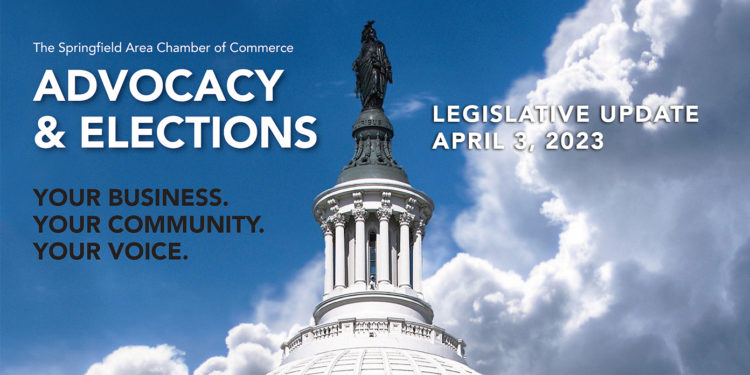Legislative Update: April 3, 2023

We’re monitoring Oregon’s 2023 legislative session for issues of impact and interest to our members. Here’s the latest update from our legislative counsel at the Oregon State Chamber of Commerce (OSCC).
We are now very close to the ever-important April 4th “first chamber” deadline, which marks both the unofficial halfway point of the session and also a reprieve from the frantic activity of the past few weeks. By end of tomorrow, all bills need to be passed out of their initial policy committee, or they will be considered dead.
This deadline is really the most important of the session because it determines the playing field for the “homestretch” of the legislative session.
There will still be a number of bills that will not survive the April 4th deadline. So far, about 1,200 of the total 2,900 bills have died. We expect a few hundred more bills to die by the end of tomorrow.
We are also starting to see an enormous list of bills with large financial impacts piling up in the Ways and Means Committee. And with a more limited pot of discretionary money available this biennium, there will be intense lobbying late in session as legislators try to get their pet projects funded. But again, most will not survive.
This past week marked the first time during the 2023 session where House Republicans joined Senate Republicans in requiring the full text of some bills to be read in their entirety. This is a tactic commonly employed to slow the session down.
Here is current status of concerning bills that OSCC is working on:
Employer Liability for Workplace Bullying (SB 851): This bill was amended down to direct BOLI to prepare a model ‘respectful workplace’ policy that employers can adopt. OSCC no longer opposes the bill.
Expanded Right to Refuse Dangerous Work (SB 907): SB 907 was amended down to make Oregon’s current “right to refuse work” law consistent with the federal law. OSCC no longer opposes the bill.
Mandatory Pay Disclosures for Job Postings (SB 925): SB 925 would have required employers to disclose pay range and employment benefits within all job postings. Failure to do so would subject an employer to a lawsuit or employment claim. SB 925 is now dead.
Expanded age discrimination liabilities (HB 2800): HB 2800 layers added complexity into Oregon’s existing age discrimination laws by compromising employers’ ability to consider experience and by requiring employers to bear burden of proof that age discrimination did not take place for adverse employment decisions. HB 2800 is now dead.
Risk-based premium setting (HB 2920): Many OSCC members were concerned about this bill which would disallow insurance companies from considering credit history, criminal history and other factors when determining auto insurance premiums. HB 2920 is now dead.
Elimination of Natural Gas in Residential Housing (HB 3152): HB 3152 phases out the use of natural gas in the residential housing sector. It prevents line extension allowances for new gas line extensions that support the use of gas in residential buildings. We believe HB 3152 will die.
First party lawsuits on insurance claims (HB 3242 and HB 3243): Allows policy holders to sue their insurance companies for bad faith. These bills have been tried in other states and have benefitted few but resulted in significant premium spikes in commercial policies for all. These bills have passed committee and are awaiting a vote on the House floor. OSCC opposes these bills.
DEQ Title V permit fees (HB 3229): This bill is a massive 80% increase in Title V air emissions fees implemented by DEQ. Will hurt local manufacturers as permit costs are increased to save DEQ regulator positions. The bill also allows DEQ to raise additional fees without legislative approval. We believe this bill will advance for further discussion.
Other bills still alive the OSCC supports include:
Increased estate tax exemption (HB 2426): Legislators are starting to express concern that Oregon’s estate tax is being levied on middle income Oregonians due to high real estate values.
Increased CAT Tax exemption (HB 2433 / SB 127): OSCC continues to be optimistic that a solution can be found that would increase the CAT tax threshold to as high as $5 million from the current level of $1 million.
Hiring and Retention bonuses (HB 3205): This bill would allow employers to begin to offer hiring and retention bonuses again as current state pay equity laws have made these bonuses legally tenuous. This bill will advance.
The Springfield Chamber of Commerce will be publishing the OSCC’s legislative updates weekly, or as received. Any opinions expressed or implied are those of OSCC and do not necessarily reflect those of the Springfield Chamber or its representatives. If you’d like more information, please visit our Advocacy & Elections Page.
Discover more from Springfield Bottom Line
Subscribe to get the latest posts sent to your email.






